日常生活類新聞組圖獲獎照片 金獎 痛苦之島 For 150 years, men have been coming to these islands in the coast off Peru to collect guano, bird dung used as an organic fertilizer. In the past it was considered a strategic product, and it triggered wars. Today, men from the highlands struggle to get the lasts remains of guano, but the birds' population has declined from 60 millions to 4 millions. The era of guano is coming to an end.在與秘魯海岸線遙相呼應的小島上,150多年前就已有人類的足印。人們紛至沓來,收集鳥類糞便,然后帶回大陸制作有機肥料。糞便如此重要,甚至還引發過戰爭。現在仍有從內陸高地來的人們來到島上采集鳥糞,但由于鳥類的數量已由過去的6000萬只減少到400萬只,鳥類糞便數量銳減。 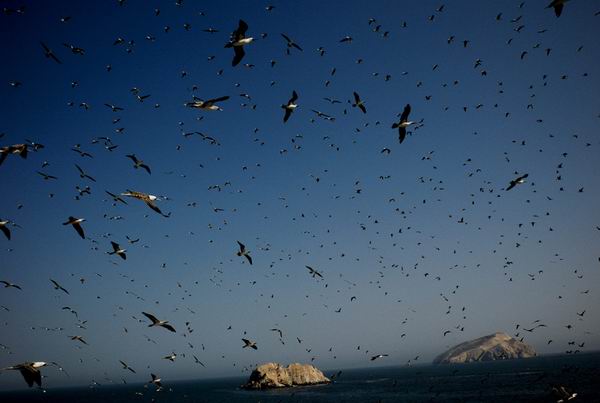
??? 10-01:Sea birds, mostly Piqueros (Peruvian Booby) flying over Guaape Norte Island in the coast off Peru, April 19, 2009. 2009年4月19日,大群海鳥飛過與秘魯海岸遙相呼應的小島上空。
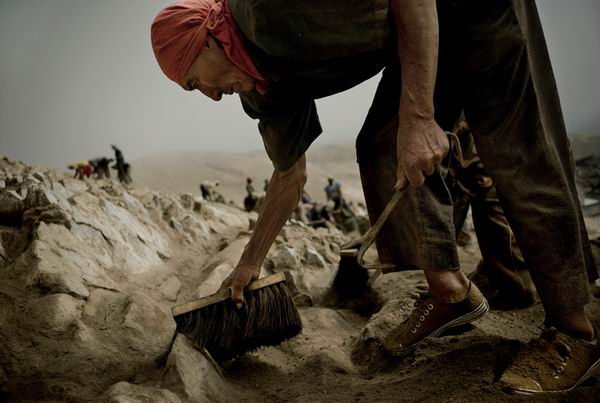
??? 10-02:Domingo Leon, 63, scrapes and brushes the dung off from the harsh rocks of Guaape Norte Island. The collection of guano is a strenous job, their daily task is to collect around 35 sacks of 50kg guano. Photo taken on April 16, 2009. 2009年4月16日,在與秘魯海岸遙相呼應的小島上,63歲的里昂用鏟子和刷子將鳥類糞便從巖石上剝離下來,他每天規定的工作量為50公斤。
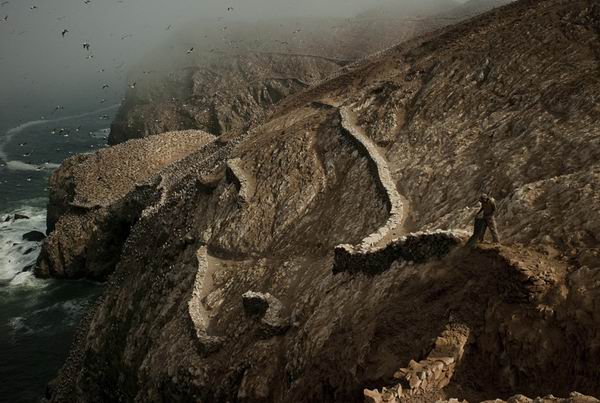
??? 10-03: A laborer throws the feathers and bones away at an island off the coast of Peru.. The stone walls were built to hold the guano while it is accumulated during a 10 years period. Then workers come back to collect it. Photo taken on April 17, 2009. 2009年4月17日,在在與秘魯海岸遙相呼應的小島上,一名工人把無用的羽毛和鳥骨倒入海中。被修建在巖上上的小石墻用來積累糞便,10年后工人們將返回島上,重新開始收集工作。
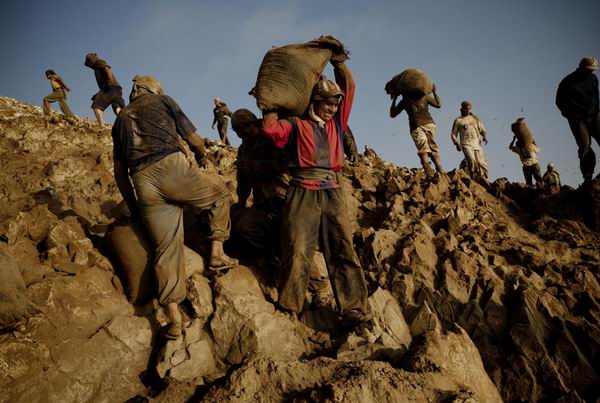 ? ???? 10-04:Workers are loaded with a 50kg sack of guano. Each porter has to carry 125 sacks a day. April 19, 2009. 2009年4月19日,工人們在小島上運送糞便,每袋重達50公斤。他們每天的工作量為125袋。 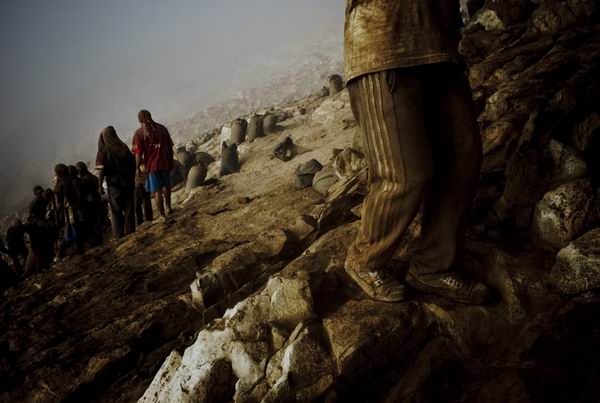
??? 10-05: A worker carries a 50kg sack of guano through the harsh rocks to the sieve, as others line up to receive sacks. Photo taken on April 20, 2009. 2009年4月20日,一名工人將收集物送去過篩,其余工人正在排隊等待分給自己的麻袋。 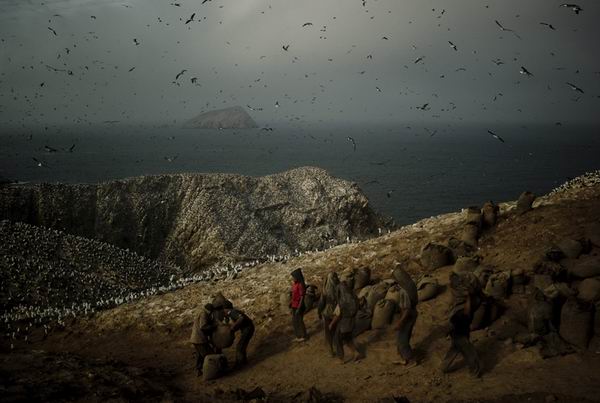
??? 10-06:Workers, many of whom are barefoot, line up to receive a 50kg sack of guano. Every single corner of the island is used by the birds to nest. Workers are not allowed to walk outside the working area so as not to scare birds away while nesting. During the years that the island is not under collection campaign, a guard assigned by the company will keep visitors away and protect the birds. Photo taken on May 18, 2008. 2008年5月18日,工人正在排隊等待分給自己的麻袋。島上的每寸土地都要留給鳥類筑巢棲息,工人們只能在工作區內活動。工人們離開后,島上會留一名保衛人員,阻止游客進入小島。

??? 10-07:At the end of the working day laborers are exhausted. They live and work in the island during three months shifts, earning around 280 euros a month. Here they are waiting for the lasts sacks of Guano of their task. Photo taken on May 18, 2008.2008年5月18日,一天下來工人們已精疲力盡,他們在等待最后一批搬運鳥糞的任務。這些工人居住在島上,每三個月倒班一次,每次掙280歐元。 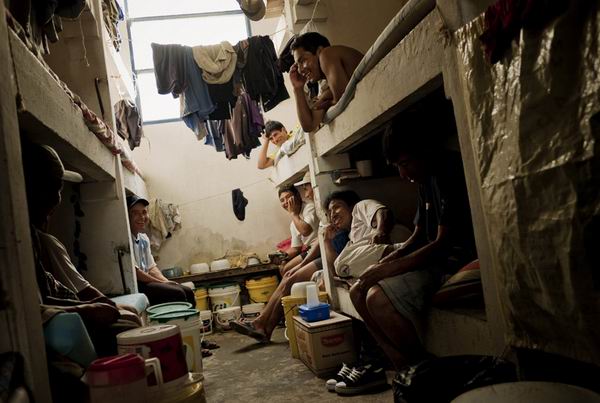
??? 10-08:Workers relax at their berths in the afternoon. April 16, 2009. 2009年4月16日,工人們下午在宿舍休息。 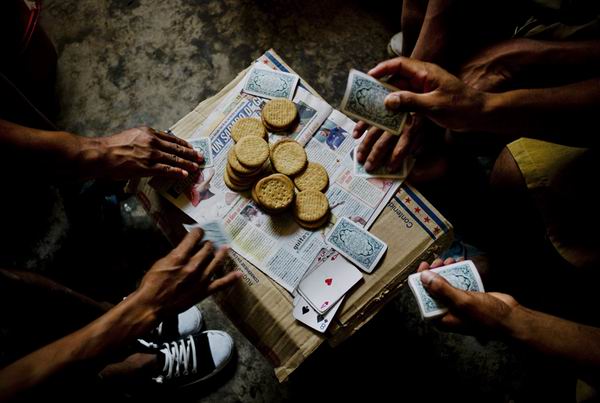
??? 10-09: Workers bet cookies as they play cards. Photo taken on April 17, 2009. 2009年4月17日,工人們以餅干為賭注玩撲克牌。
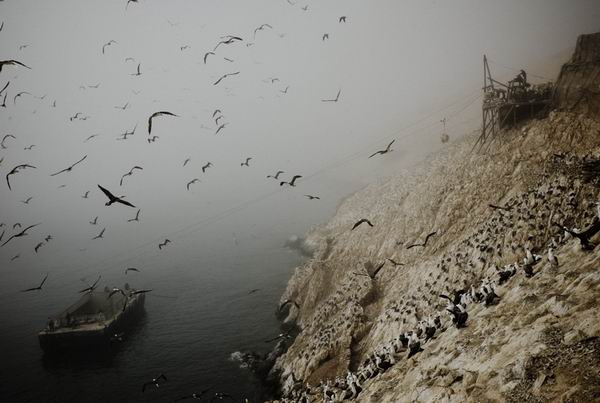
??? 10-10:On a foggy afternoon, an old platform is used to load a barge with the sacks of guano. April 20, 2009. 20094月20日,工人們用駁船進行運送一袋袋的鳥糞。 ?
|